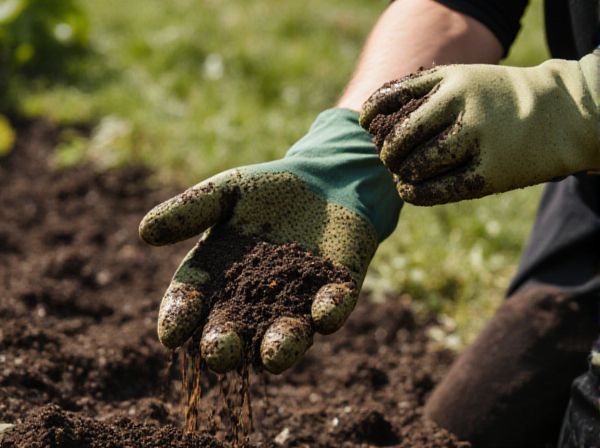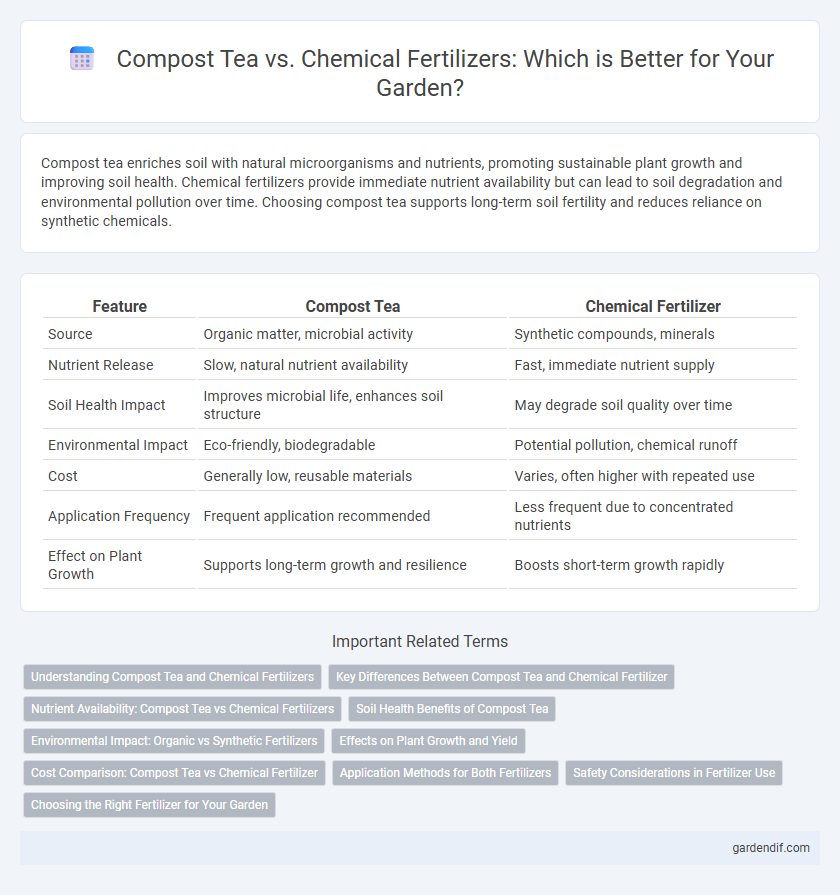
Compost tea vs chemical fertilizer Illustration
Compost tea enriches soil with natural microorganisms and nutrients, promoting sustainable plant growth and improving soil health. Chemical fertilizers provide immediate nutrient availability but can lead to soil degradation and environmental pollution over time. Choosing compost tea supports long-term soil fertility and reduces reliance on synthetic chemicals.
Table of Comparison
| Feature | Compost Tea | Chemical Fertilizer |
|---|---|---|
| Source | Organic matter, microbial activity | Synthetic compounds, minerals |
| Nutrient Release | Slow, natural nutrient availability | Fast, immediate nutrient supply |
| Soil Health Impact | Improves microbial life, enhances soil structure | May degrade soil quality over time |
| Environmental Impact | Eco-friendly, biodegradable | Potential pollution, chemical runoff |
| Cost | Generally low, reusable materials | Varies, often higher with repeated use |
| Application Frequency | Frequent application recommended | Less frequent due to concentrated nutrients |
| Effect on Plant Growth | Supports long-term growth and resilience | Boosts short-term growth rapidly |
Understanding Compost Tea and Chemical Fertilizers
Compost tea is a nutrient-rich liquid derived from steeping compost in water, providing beneficial microorganisms and organic matter that enhance soil health and plant growth. Chemical fertilizers contain synthesized nutrients such as nitrogen, phosphorus, and potassium, delivering immediate nutrient availability but potentially harming soil biodiversity over time. Understanding the differences in nutrient release, environmental impact, and soil health benefits is essential for selecting the appropriate fertilizer for sustainable agriculture.
Key Differences Between Compost Tea and Chemical Fertilizer
Compost tea is a liquid extract rich in beneficial microorganisms that enhances soil biology and promotes plant health through natural nutrient cycling, while chemical fertilizers provide specific inorganic nutrients in concentrated forms for immediate nutrient availability. Unlike chemical fertilizers, compost tea improves soil structure and microbial diversity, reducing chemical runoff and environmental impact. The nutrient release in compost tea is slower and more sustainable, fostering long-term soil fertility compared to the quick but temporary nutrient boost from chemical fertilizers.
Nutrient Availability: Compost Tea vs Chemical Fertilizers
Compost tea provides a slow-release source of nutrients enriched with beneficial microorganisms that enhance soil health and nutrient uptake. Chemical fertilizers deliver immediate nutrient availability, offering precise concentrations of nitrogen, phosphorus, and potassium essential for rapid plant growth. The microbial diversity in compost tea supports long-term soil fertility, unlike chemical fertilizers which can lead to nutrient leaching and soil degradation over time.
Soil Health Benefits of Compost Tea
Compost tea significantly improves soil health by enhancing microbial diversity and activity, which supports nutrient cycling and disease suppression. Unlike chemical fertilizers that often degrade soil structure and reduce beneficial organisms, compost tea fosters a balanced ecosystem, increasing organic matter and soil aeration. Regular application promotes long-term soil fertility and resilience, leading to sustainable crop growth.
Environmental Impact: Organic vs Synthetic Fertilizers
Compost tea enhances soil biodiversity and nutrient cycling, reducing the risk of water pollution and greenhouse gas emissions compared to chemical fertilizers. Chemical fertilizers often lead to nutrient runoff, causing eutrophication in aquatic ecosystems and long-term soil degradation. Using compost tea supports sustainable agriculture by promoting healthier soil ecosystems and minimizing environmental harm.
Effects on Plant Growth and Yield
Compost tea enhances plant growth and yield by improving nutrient availability, soil health, and microbial activity, leading to robust root development and increased resistance to pests and diseases. Chemical fertilizers provide readily available nutrients that result in rapid growth and higher immediate yields but may cause soil degradation and reduced microbial diversity over time. Integrating compost tea with chemical fertilizers can optimize nutrient uptake and sustain long-term productivity in crops.
Cost Comparison: Compost Tea vs Chemical Fertilizer
Compost tea generally incurs lower overall costs due to its use of organic waste materials and on-site brewing, reducing the need for expensive synthetic inputs. Chemical fertilizers require consistent purchase expenses and specialized storage, increasing long-term financial commitments for farmers. Cost efficiency of compost tea is enhanced by its environmental benefits and soil health improvements, potentially reducing fertilizer dependency over time.
Application Methods for Both Fertilizers
Compost tea is typically applied through foliar spraying or soil drenching, allowing beneficial microbes and nutrients to actively enhance plant growth and soil health. Chemical fertilizers are commonly distributed via broadcasting, side-dressing, or fertigation, providing targeted nutrient supply but often lacking microbial benefits. Proper application methods influence nutrient availability, environmental impact, and crop yield outcomes for both fertilizer types.
Safety Considerations in Fertilizer Use
Compost tea offers a safer alternative to chemical fertilizers by reducing the risk of toxic runoff and minimizing soil and water contamination. Unlike chemical fertilizers that may contain harmful synthetic compounds, compost tea improves soil health through natural microbial activity, lowering environmental hazards. Proper preparation and application of compost tea are crucial to ensure pathogen-free usage and maximize its safety benefits for plants and ecosystems.
Choosing the Right Fertilizer for Your Garden
Compost tea enhances soil microbiome health by introducing beneficial microorganisms, improving nutrient availability and plant resilience, whereas chemical fertilizers provide immediate nutrient release but may degrade soil quality over time. Selecting the right fertilizer depends on your garden's specific needs, soil condition, and long-term sustainability goals, with compost tea promoting organic growth and chemical options offering precise nutrient control. Balancing these factors ensures optimal plant growth, soil fertility, and environmental impact.
Compost tea vs chemical fertilizer Infographic

 gardendif.com
gardendif.com